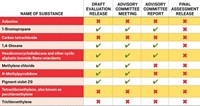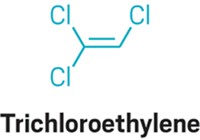Advertisement
Grab your lab coat. Let's get started
Welcome!
Welcome!
Create an account below to get 6 C&EN articles per month, receive newsletters and more - all free.
It seems this is your first time logging in online. Please enter the following information to continue.
As an ACS member you automatically get access to this site. All we need is few more details to create your reading experience.
Not you? Sign in with a different account.
Not you? Sign in with a different account.
ERROR 1
ERROR 1
ERROR 2
ERROR 2
ERROR 2
ERROR 2
ERROR 2
Password and Confirm password must match.
If you have an ACS member number, please enter it here so we can link this account to your membership. (optional)
ERROR 2
ACS values your privacy. By submitting your information, you are gaining access to C&EN and subscribing to our weekly newsletter. We use the information you provide to make your reading experience better, and we will never sell your data to third party members.
Regulation
Biden calls for review of recent EPA actions
Decisions on chemical risks, pesticides, and science under scrutiny
by Cheryl Hogue , Britt E. Erickson
January 20, 2021

President Joe Biden is ordering a sweeping review of Trump administration regulations, including more than a dozen Environmental Protection Agency actions directly affecting commercial chemicals and the chemical industry.
On his first day in office Jan. 20, Biden planned to issue an executive order aimed at ensuring public health and environmental protections and bolstering science to address climate change, according to a press release issued by his team early that day. The planned order requires federal agencies to review regulations in light of these goals.
The Biden team distributed a list of specific regulations the president wants scrutinized, although reviews aren’t limited to just them. The president’s list includes a number of controversial Trump EPA safety decisions on commercial chemicals and pesticides. Another regulation under review affects the science the EPA relies on as it crafts pollution control requirements. One more diminished requirements to protect communities and workers from industrial chemical accidents. The US chemical industry’s main lobbying group, the American Chemistry Council (ACC), supported many of these actions.
The Biden administration will take a close look at the EPA’s procedures for evaluating chemical risks under 2016 revisions to the Toxic Substances Control Act (TSCA). Environmental groups sued the agency in 2017 for narrowing the set of uses that it considers in its evaluations and for limiting the time period for requesting toxicity data from manufacturers. A federal appeals court ruled partly in favor of the groups in 2019.
Biden’s team will also investigate the EPA’s move to fast-track decisions on whether to regulate five persistent, bioaccumulative, and toxic chemicals under TSCA: flame retardants decabromodiphenyl ether and tris(4-isopropylphenyl) phosphate; pentachlorothio-phenol, which softens rubber; 2,4,6-tris(tert-butyl)phenol, an additive in fuels or lubricants; and hexachlorobutadiene, which is used as a solvent and to make rubber and lubricants
One of the first 10 chemicals the EPA evaluated under the revised TSCA was methylene chloride. The agency finalized that assessment in June 2020. Environmental groups then sued the EPA, claiming that the agency underestimated methylene chloride risks to workers and ignored risks to the general population from contamination of air, water, and soil. The EPA finalized a rule in 2019 to ban methylene chloride in consumer paint removers, but the agency withdrew its proposal to ban the solvent in commercial paint removers.
Biden is also calling for scrutiny of one of the EPA’s first moves under the Trump administration: denying a petition from environmental groups to ban the organophosphate pesticide chlorpyrifos on food crops. The decision prompted an intense political and legal fight that is ongoing. A few US states, including California, and the European Union have banned the use of chlorpyrifos because of neurodevelopmental risks to children. The EPA proposed to ban chlorpyrifos twice under the Obama administration, but those proposals were never finalized. Instead, the Trump administration chose to continue studying the risks until 2022.
Another target for review is the Trump administration’s Jan. 6 rule that altered how the EPA weighs the science it uses to underpin pollution limits. It drew criticism from scientific and environmental organizations and praise from the ACC.
A related rule to be reviewed changed how the EPA calculates the costs and benefits of rules to ratchet down air pollution. Critics say the move hobbled the EPA’s ability to regulate under the Clean Air Act. The ACC also supported this rule.
Additionally, Biden is calling for examination of the Trump EPA’s decisions not to tighten limits on particulate matter and ground-level ozone to protect public health. These decisions broadly meant no additional emission reductions for most polluters, including chemical manufacturers.
Biden is further directing his administration to look over a 2019 rule that weakened risk management requirements designed to protect neighborhoods and workers at 2,500 plants that use, make, or store some of the world’s most hazardous chemicals. The ACC backed those changes as well.
And Biden is calling for a look back at the EPA’s decision in July that no federal limits are needed for perchlorate in drinking water. His administration will also look at the EPA’s Jan. 15 revision to longstanding requirements limiting lead and copper in drinking water.





Join the conversation
Contact the reporter
Submit a Letter to the Editor for publication
Engage with us on Twitter